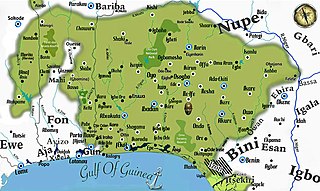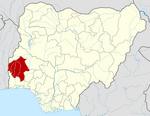
Ibadan is the capital and most populous city of Oyo State, in Nigeria. It is the third-largest city by population in Nigeria after Lagos and Kano, with a total population of 3,649,000 as of 2021, and nearly 4 million within its metropolitan area. It is one of the country's largest cities by geographical area. At the time of Nigeria's independence in 1960, Ibadan was the largest and most populous city in the country, and the second-most populous in Africa behind Cairo. Ibadan is ranked one of the fastest-growing cities in sub-Saharan Africa, according to the UN Human Settlements Program (2022). It is also ranked third in West Africa in the tech startups index. Ibadan joined the UNESCO Global Network of Learning Cities in 2016.

Ogbomosho is a city in Oyo State, south-western Nigeria. It was founded in the mid 17th century. The population was approximately 655,517 in 2024. It is the second largest city in Oyo State and also among the most populated in Nigeria. It is the 3rd most populated city in South Western Nigeria after Lagos and Ibadan. The City itself has 5 local governments, which makes it one of the largest cities in Nigeria. Although the principal inhabitants of the city are the Yoruba people, there are people from other parts of Nigeria and other West African countries who are residents in the city.

Ilorin is the capital city of Kwara State located in the Western region of Nigeria. Although Ilorin is classified under the North-Central geopolitical zone, the city is considered a Yoruba city by all historical and sociological standards. As of the 2006 census, it had a population of 777,667, making it the 7th largest city by population in Nigeria.

Yorubaland is the homeland and cultural region of the Yoruba people in West Africa. It spans the modern-day countries of Nigeria, Togo and Benin, and covers a total land area of 142,114 km2 (54,871 sq mi). Of this land area, 106,016 km2 (74.6%) lies within Nigeria, 18.9% in Benin, and the remaining 6.5% is in Togo. Prior to European colonization, a portion of this area was known as Yoruba country. The geo-cultural space contains an estimated 55 million people, the majority of this population being ethnic Yoruba.
Fújì is a genre of Yoruba popular music that emerged in Nigeria in the 1960s. It evolved from the improvisational wéré music also known as ajísari (meaning "waking up for sari", performed to awaken Muslims before dawn during the fasting season of Ramadan. Fuji music was named after the Japanese stratovolcano-mountain, Mount Fuji by Alhaji Sikiru Ayinde Barrister. It features energetic beats, diverse Yoruba rhythms, and call-and-response vocals. Fuji's influence extends into contemporary music, with its hooks and rhythms frequently appearing in Nigerian hip hop.

Kwara State is a state in Western Nigeria, bordered to the east by Kogi State, to the north by Niger State, and to the south by Ekiti, Osun, and Oyo states, while its western border makes up part of the international border with Benin. Its capital is the city of Ilorin and the state has 16 local government areas.
The Ìgbómìnà are a subgroup of the Yoruba ethnic group, which originates from the north central and southwest Nigeria. They speak a dialect called Ìgbómìnà or Igbonna, classified among the Central Yoruba of the three major Yoruba dialectical areas. The Ìgbómìnà spread across what is now southern Kwara State and northern Osun State. Peripheral areas of the dialectical region have some similarities to the adjoining Ekiti, Ijesha and Oyo dialects.

The Egba people are a subgroup of the Yoruba people, an ethnic group of western Nigeria, a majority of whom are from the central part of Ogun State, that is Ogun Central Senatorial District.
Offa is a city in Kwara State of Nigeria, with a population of about 166,112 inhabitants. The town is noted for its weaving and dyeing trade, using vegetable dyes made from locally grown indigo and other plants. Offa is well known for the cultivation of sweet potatoes and maize which also formed part of the favourite staple foods for the indigenes in the town. Cattle, goats and sheep are also raised there. The main religions practiced in the town are Islam, Christianity and traditional religions.
Abdulkareem Adisa was a Nigerian major general who was military governor of Oyo State during the military regime of General Ibrahim Babangida. He was convicted for involvement in an attempted coup against military head of state General Sani Abacha in 1997, and was on death row when Abacha died in June 1998. He was subsequently pardoned.
Gbedu literally means "big drum" and is a percussion instrument traditionally used in ceremonial Yoruba music in Nigeria and Benin. More recently, the word has come to be used to describe forms of Nigerian Afrobeats music.
Oyo Igboho is a large town in Oyo State, Nigeria. It is the headquarters of the Orelope Local Government Area. It has an estimated population of 400,000.
Omupo or Omu-ipo is an ancient Igbomina-Yoruba town situated in the southeastern part of Kwara State. It is one of the prominent towns in Ifelodun Local Government Area of the State. It is the headquarters of 34 communities of Omupo District, the headquarters of Omupo/Idofian Area Council of Ifelodun Local Government. Omupo Constituency was also created in 1979 for a representative to the Kwara State House of Assembly.
The Ilorin Emirate is a traditional state based in the city of Ilorin in Kwara State, Nigeria. It is largely populated by the Yoruba-speaking people, though the kingdom is a hybrid state due to the influence of the many other tribes that make up the city.
Ejigbo is an important town in Osun State, Nigeria. It is one of the earliest Yoruba towns, and is as old as Old Oyo founded by Oranmiyan.
Okuku is a city in the Odo Otin Local Government Area of Ọṣun State, Nigeria.
Orile Ijaye is a small town located in Akinyele local government, Oyo state, Nigeria. It is about 18 miles from Ibadan, Oyo state capital. This town was re-inhabited in 1895, 32 years after it was destroyed due to an intra-ethnic and supremacy war with Ibadan; another military power at that time. The name of the town came from the original name, Ijaye, the name meaning Ijaye city-town.
Chief Theophilus Olabode Avoseh, known as T. Ola Avoseh, was a local historian, writer and chief of Badagry, Lagos. He wrote several booklets and pamphlets in the English and Yoruba languages on aspects of the history and culture of Badagry and Epe towns in Lagos, Nigeria.
Jaigbade Alao whose birth name is Muhammad Àmínù Kúrángà was a Nigerian musician from the North Central part of Nigeria. He is the progenitor of the Dadakuada genre of music, which he started in 1939 and in December 2022, he was recognised by the Kwara State Government as one of the most distinguished personalities in the state.
Muhammad Kamalud-Deen, also known as Alhaji Agba (1893–2005), was a prominent Islamic scholar and the founder of Azumratul Adabiyyah Al-Kamoliyyah, the Ansarul Islam Society of Nigeria, Muhammad Kamalud-deen College, and Muhammad Kamalud-deen University, Nigeria. Following his passing, he was succeeded by his son, Sofiyyullah Muhammad Kamalud-deen.







